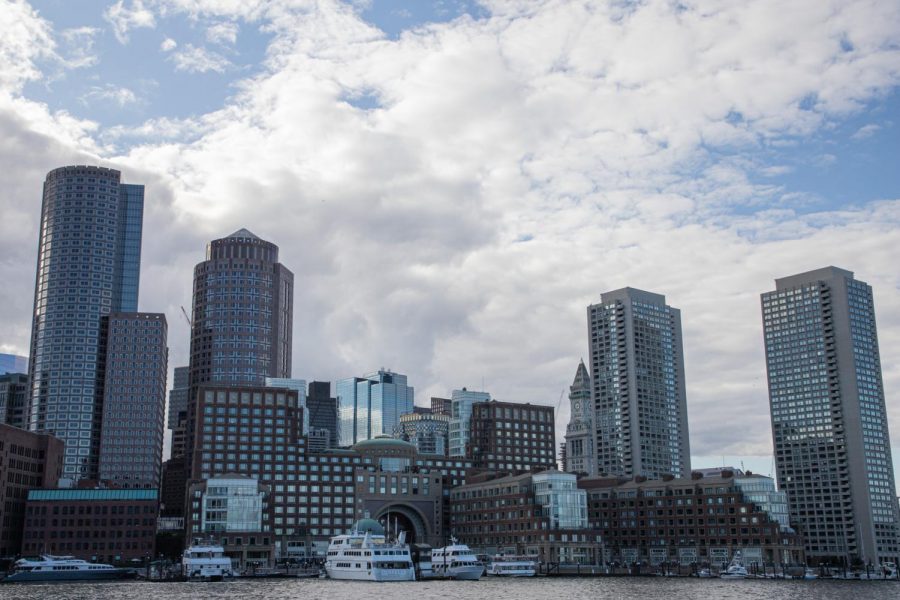Local officials and activists put forth plans to combat rising sea levels
With a lack of federal government precautions, local officials are acting to protect the city from coastal flooding.
November 22, 2019
The risk of coastal flooding in Boston grows greater every year. The city released Climate Ready Boston in 2016 to prepare for the effects of climate change. Since then, Boston has been addressing the challenges of creating a harbor front resilient to coastal flooding.
According to the executive summary of the resilient coastal plan published by Climate Ready Boston, there are 11 strategies that need to be carried out. Some steps involve educating Bostonians on the issue, while others are about modifying or building infrastructure to withstand the effects of flooding.
Bruce Berman, director of strategy and communications at Save the Harbor, a nonprofit aiming to restore and protect the Boston Harbor waterfront, urged citizens to be more aware of these ongoing changes.
“These are real problems that need real solutions,” he said. “We need to address the causes of climate change, reducing carbon footprint as a society and decreasing the amount of fossil fuel. This is encouraged by the city and state policies.”
Brian Helmuth, a professor of marine and environmental sciences at Northeastern, linked the rapid pace of climate change to a lack of federal government planning. Despite failures at the federal level, he praised the responsiveness of local government initiatives to community concerns.
“People are starting to talk about it, especially in Boston, and while a lot of the plans that the city of Boston propose aren’t perfect, in my experience, they are being responsive, they are willing to listen to different opinions,” Helmuth said. “I’m hopeful that Boston is going to be ahead of the curve because the city is being proactive.”
Regardless of government response, flooding is happening sooner than expected. A king tide, or an unusually high tide that happens once or twice a year, caused minor flooding on the waterfront in late October.
Flooding is already an issue for many residents along the Boston Harbor but leaving their homes is not an option for many. Alice Brown, a representative of NGO Boston Harbor Now, said the Climate Ready Boston initiative was focused on how the city can make changes closer to the water.
“People talk about about retreat but here in Boston, not only do we have housing, we also have transportation infrastructure — we can’t all just move to a different part of Massachusetts,” Brown said. “There’s a reason why Boston is a hub of this region. Because it has so much infrastructure to support all of that.”
One approach to combat retreat highlighted by both Helmuth and Climate Ready Boston is to let more water into the city. Building canals or utilizing sunken areas such as amphitheaters could be new ways to store the water. Climate Ready Boston also proposed creating more green space near the harbor such as parks to help in soaking up the floods.
In Boston, harbors already have concrete walls, which shift the erosion of the coast to areas where walls cannot be built. Helmuth suggested these structures be part of a new hybrid approach.
“I think the best approach is some sort of hybrid where you use hard structures but do it in a way that can enhance biodiversity,” Helmuth said. “For example, you can use riprap in places that can foster the growth of some natural existent ecosystems that can increase fish production.”
Mayor Martin J. Walsh pledged 10% of the city’s capital budget, approximately $349 million, to fund Climate Ready Boston in April. For many citizens, it may be a daunting amount of money. But Helmuth believes that with the numerous coastal flooding incidents per year — the king tide being just one of them — funds that would be needed for clean up efforts would lead to an even greater cost than a one time fix.
“The ultimate cost savings would be way higher… Being proactive is a much more cost effective way of doing things,” he said.
According to a 2013 study in Nature Climate Change, Boston is the eighth-highest coastal city in the world in average annual economic loss due to flooding, estimated at $237 million in 2005 and estimated to be $741 million annually in 2050.
Sen. Sheldon Whitehouse, D-R.I., has been pressing the urgency of actions against global warming in Congress since April 2012, giving over 250 weekly climate speeches on the Senate floor.
In a lecture at the New England Aquarium Nov. 7, Whitehouse explained that rising sea levels could have a disastrous impact on the coastal housing market in the near future, potentially doing more economic damage than the nation’s 2008 housing crisis. He believes this risk could shape the politics surrounding climate change.
“Now, businesses, banks and housing industries are beginning to see the risks and economic impact climate change will have in the future,” Whitehouse said. “This is going to change the political landscape on climate change.”
With such large forces of power now backing up voices in the government, Whitehouse predicts a dramatic shift in the political dynamic of America.
The dynamic in Boston and within the local government has also shifted, and the people of Boston are looking to the local initiatives to lead this action towards resilience.








